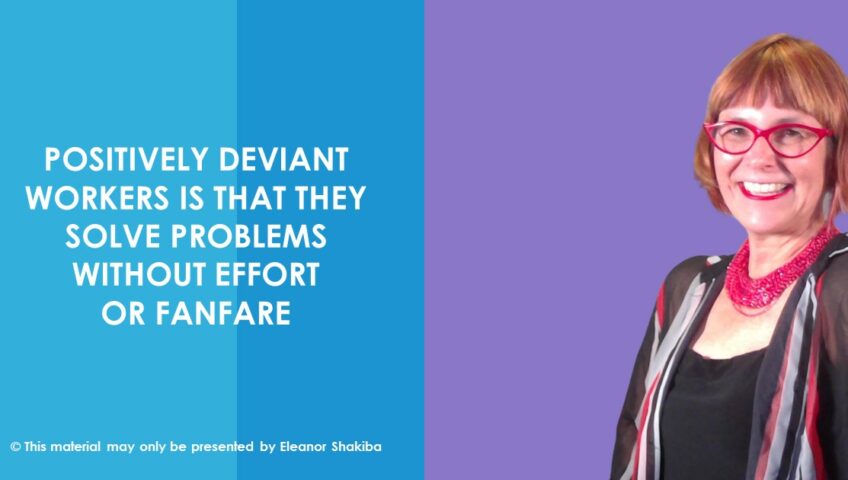Is a team member who designs shortcuts lazy or brilliant? This question sparked hot debate in a recent positive leadership workshop in an engineering company. Craig was an experienced manager. He was bemoaning the ‘bad work ethic’ of a long-term employee on his team. Apparently, this team member had devised a range of shortcuts which enabled him to significantly reduce time spent on repetitive tasks.
Craig claimed this meant the employee spent a lot of time ‘lounging around’. Cynthia pointed out that this might not be laziness, it might be an example of savvy work redesign. The group then had an in-depth discussion of what being a ‘hard worker’ in the age of knowledge working means.
This discussion was an ideal starting point for a session on positive deviance. What is fascinating about positively deviant workers is that they solve problems without effort or fanfare. They naturally think differently to their teammates. This means they spontaneously find new ways to do things and subtly shift the dynamics of workplace interaction. Whenever I teach the theory of positive deviance, I see a small proportion of leaders’ eyes light up. Typically, these leaders are themselves positive deviants and naturally see the connection between constructively ‘abnormal’ behaviour and organisational success.
You’ve heard me talking about positive deviance before because it’s one of my favourite topics. These days I specialise in working with positively deviant leaders and HR practitioners. During thousands of hours of coaching and training, I’ve learned there are some important things we need to remember when working with positive deviants in our businesses. By definition, they’re not like the rest of us. This is why they’re so valuable. However, they are often misunderstood or maligned – just like Craig’s employee. Smart trainers and facilitators know how to spot and bring out the best in their positive deviants. So how can you do this?
Here are a few simple techniques which are based on positive psychology training and positive deviance models. Remember that positive deviants often don’t fit in. This means they may tend to work alone or naturally gravitate to roles such as internal consultants in which they can thrive.
Problems don’t look the same to positive deviants. Indeed, because they’re quirky and creative, positive deviants often don’t even see that a problem exists. Instead, they take action and find spontaneously brilliant workarounds or solutions. Highly attuned leaders spot this behaviour and encourage positive deviants to share their new ways of working so teams can accelerate their success.
Solution focused thinking is the positive deviant’s standard way of operating. This means they will become frustrated in meetings which focus on why problems exist, or why those issues can’t be solved. They don’t ask questions like this. They are curious and spontaneous – naturally building solutions where others see barriers. Great leaders tap into this ability.
Of course, trainers and coaches can be positive deviants, too! If this sounds like you, you can find out more about positive psychology training techniques in the Positive Psychology Toolkit for HR and L&D Practitioners. This free resource is brought to you by Eleanor Shakiba and the team at Think Learn Succeed.
About the author: Eleanor Shakiba
Eleanor is a trainer and coach, with a passion for unleashing the power of positive deviance in talented people. She has taught more than 50,000 people how to excel professionally. An expert in the field of Positive Psychology, Eleanor is also qualified in Social Anthropology, Counselling, Coaching, Adult Education and Neuro Linguistic Programming. She specialises in helping HR and L&D practitioners to unleash the power of positive psychology in business. Her major focus in developing three key areas that support positive workplace cultures: positive mindset, proactive communication and purposeful leadership. Eleanor is the author of the Positive Psychology Toolkit for HR and L&D Practitioners. Download your free copy here.
